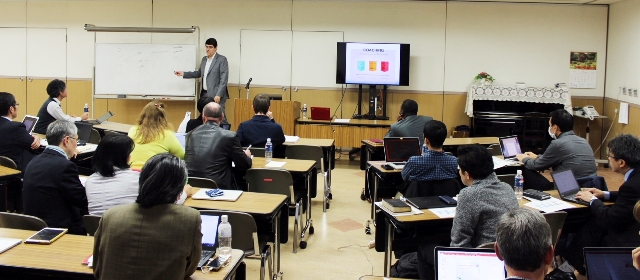A three-day church planting seminar was held from November 28 to 30, 2017, at the Japan Union Conference office in Tachikawa, Japan. Dr. Gerson Santos, associate secretary of the General Conference (GC), led this seminar, and another GC associate secretary, Dr. Karen Potter, and her husband Michael served as lecturers. Other lecturers included Pastor Doug Venn, GC coordinator for Mission to the Cities; Dr. Ronald Kuhn, associate director of the Institute of World Mission; and Greg and Army Whitsett, who are serving at the Center of East Asian Religions and Traditions, which is based in Bangkok. All of them have rich experiences in mission work and cross-cultural effort. As they conducted the seminar, they considered the cultural differences between Japan and western countries, and at the same time, tried to implement universal principals of mission to the Japanese field.

It can be said that in terms of mission work, people are of more importance than budget or method. What made this seminar unique is that it used a personal approach. At the stage of recruiting seminar participants, Dr. Santos mentioned that under 10 people is ideal and the limit should be 15. Twelve pastors and two conference presidents and the union director of evangelism participated in the program.
Before the seminar began, every participant was required to complete an online evaluation on spiritual gifts as a church planter as well as other personality analysis. Most of the participants were surprised at how well the results of the evaluation reflected who they are. Everyone has strengths and weaknesses.
The participants were also encouraged to form a ministry team, and they had time to think about what kind of persons he or she needed for making an ideal church planting team. Participants were allowed to bring their spouse if desired, and the spouses also participated in evaluations and interviews from the instructors. This can be considered a very practical approach because church planting work would not be successful without the support of the family.
Before the seminar began, every participant was required to complete an online evaluation on spiritual gifts as a church planter as well as other personality analysis. Most of the participants were surprised at how well the results of the evaluation reflected who they are. Everyone has strengths and weaknesses.
The participants were also encouraged to form a ministry team, and they had time to think about what kind of persons he or she needed for making an ideal church planting team. Participants were allowed to bring their spouse if desired, and the spouses also participated in evaluations and interviews from the instructors. This can be considered a very practical approach because church planting work would not be successful without the support of the family.
Dr. Santos clearly emphasized at the seminar that the establishment of the church does not mean growth of a congregation to have their own building and pastor. He said we shouldn’t ask where the church is or what time church starts. We should ask where and what time the church will “meet.” Actually, some churches meet at different places each week. The first century church had no property or building, but they grew most rapidly in all of Christian history. The Adventist Church also had nothing when they started.
Dr. Santos announced that a follow-up meeting will be planned to see the progress of participants’ church planning work. We see the tremendous potential of this type of approach for church planting in Japan. May the Lord send us many more gospel workers to reach the perishing world with eternal hope.
Dr. Santos announced that a follow-up meeting will be planned to see the progress of participants’ church planning work. We see the tremendous potential of this type of approach for church planting in Japan. May the Lord send us many more gospel workers to reach the perishing world with eternal hope.
Yutaka Inada, NSD Executive Secretary
